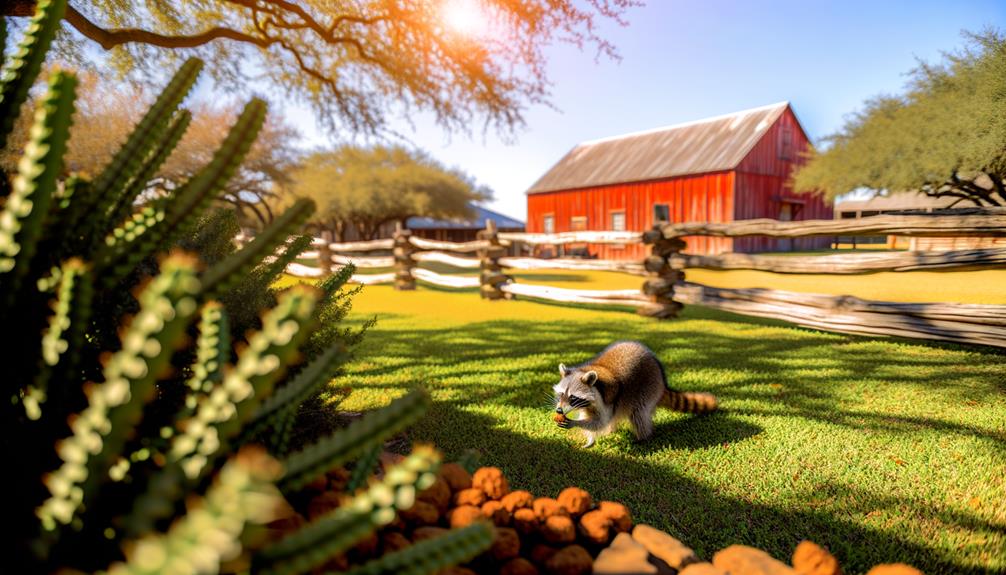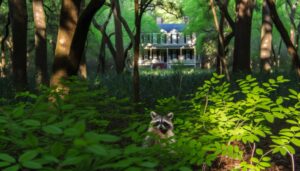How You Can Have a Pet Raccoon in Texas
In Texas, owning a pet raccoon is legally permissible but requires compliance with specific regulations. Raccoons are classified as nongame animals, so you must obtain a Wildlife Permit from the Texas Parks and Wildlife Department.
Housing for the raccoon must meet established standards, and you'll need veterinary certification confirming the animal's health. Annual permit renewals and compliance inspections are mandatory.
Health risks, including diseases like rabies and leptospirosis, necessitate thorough preventative measures. Raccoons require specialized care and an appropriate environment, making ownership complex.
Learn about the critical aspects of raccoon care to make an informed decision.

Key Takeaways
- A Wildlife Permit is required to legally own a raccoon in Texas.
- Housing must meet specific standards and pass inspection.
- Regular compliance checks by the Texas Parks and Wildlife Department are mandatory.
- Raccoons carry diseases like rabies and require veterinary certification and vaccinations.
- Annual permit renewal is necessary for continued ownership.
Legal Status of Pet Raccoons
In Texas, the legal status of owning a pet raccoon is governed by a combination of state wildlife regulations and local ordinances that vary by jurisdiction. State laws classify raccoons as nongame animals, which generally prohibits their capture, possession, and sale without specific authorization.
Local ordinances may impose additional restrictions, including zoning laws that affect the keeping of wild animals within city limits. Enforcement agencies, such as the Texas Parks and Wildlife Department, regulate and monitor compliance with these laws to guarantee public safety and the welfare of the animals.
As a result, individuals interested in keeping a pet raccoon must navigate a complex legal landscape, balancing regulatory compliance with ethical considerations regarding the animal's well-being.
Permits and Licensing
Acquiring the necessary permits and licenses to legally own a pet raccoon in Texas involves a thorough understanding of state and local regulatory requirements. The Texas Parks and Wildlife Department (TPWD) mandates specific permits for the possession of native wildlife. The following table illustrates the key requirements:
| Requirement | Details | Authority |
|---|---|---|
| Wildlife Permit | Required for native species | TPWD |
| Housing Inspection | Must meet specific standards | Local Authorities |
| Veterinary Certification | Health clearance needed | Licensed Veterinarian |
| Annual Renewal | Permits must be renewed yearly | TPWD |
| Compliance Check | Regular inspections for adherence | TPWD Officials |
Understanding these regulations is critical for ensuring legal and ethical pet ownership. Proper documentation and adherence to guidelines safeguard both the owner and the raccoon.
Health and Safety Concerns
When considering the health and safety implications of keeping a pet raccoon in Texas, it is crucial to address the risk of disease transmission, including rabies and raccoon roundworm.
Additionally, the potential for aggressive behavior requires careful evaluation of temperament and socialization practices.
Proper handling precautions must be observed to mitigate injury and guarantee both human and animal well-being.
Disease Transmission Risks
Given the potential for raccoons to carry zoonotic diseases, it is essential to understand the health and safety risks associated with keeping a pet raccoon in Texas. Raccoons are known vectors for rabies, a fatal viral disease that can be transmitted to humans and other animals through bites or scratches.
Additionally, raccoons may harbor raccoon roundworm (Baylisascaris procyonis), which can cause severe neurological damage in humans if ingested. Leptospirosis, a bacterial infection spread through raccoon urine, poses further health risks, potentially leading to liver and kidney damage.
Ensuring proper vaccination and regular veterinary care is critical, yet these measures may not fully eliminate the inherent risks. Therefore, thorough consideration of these disease transmission risks is essential.
Aggressive Behavior Potential
The potential for aggressive behavior in pet raccoons presents significant health and safety concerns that must be carefully evaluated by prospective owners. Raccoons, although often perceived as cute and docile, can exhibit unpredictable and sometimes violent behavior, particularly when they feel threatened or stressed. This aggression poses risks not only to the owner but also to other pets and individuals in the household.
- Physical injuries: Bites and scratches can result in serious wounds.
- Rabies transmission: Aggressive behavior may correlate with rabies, a fatal disease.
- Destructive behavior: Raccoons can damage property when agitated.
- Stress responses: Loud noises or sudden movements may trigger aggression.
- Territoriality: They may become possessive over food or space, leading to confrontations.
Understanding these risks is vital for ensuring a safe and harmonious living environment.
Proper Handling Precautions
Implementing proper handling precautions is vital to mitigate health and safety concerns associated with keeping a pet raccoon. Due to their potential to carry zoonotic diseases such as rabies and leptospirosis, it is important to maintain regular veterinary check-ups and vaccinations.
Personal protective equipment, including gloves, should be used when handling raccoons to prevent bites or scratches. It is advisable to sustain a hygienic environment, cleaning enclosures frequently to minimize disease transmission.
Proper training in handling techniques can reduce stress for both the raccoon and the handler, thereby decreasing the risk of aggressive behavior. Adhering to these practices not only safeguards the health of the raccoon but also protects the well-being of those caring for them.
Housing and Habitat Requirements
Creating an appropriate and safe habitat for a pet raccoon in Texas requires a thorough understanding of their natural behaviors and environmental needs. Raccoons are highly active, intelligent animals needing ample space and mental stimulation.
Essential considerations for their housing include:
- Enclosure Size: Guarantee the enclosure is spacious, allowing for climbing and exploration.
- Security: The habitat must be escape-proof, with sturdy locks and secure fencing.
- Enrichment: Provide various toys, puzzles, and climbing structures to avoid boredom.
- Sanitation: Maintain a clean environment with regular waste removal and disinfecting routines.
- Climate Control: Adapt the habitat to Texas's climate, ensuring protection from extreme temperatures.
These elements are vital for maintaining a raccoon's well-being and preventing behavioral issues.
Diet and Nutrition
Ensuring a balanced dietary regimen is essential for maintaining the health of a pet raccoon. This requires attention to both nutritional diversity and proper food selection. Common food choices include a mixture of fruits, vegetables, proteins, and grains, designed to mimic their natural diet.
Additionally, it is crucial to avoid foods that are toxic to raccoons, such as chocolate, caffeine, and certain artificial sweeteners.
Balanced Dietary Needs
Proper nutrition for pet raccoons in Texas requires a well-balanced diet that replicates their natural foraging habits and provides essential nutrients for their health and well-being. Raccoons are omnivorous, necessitating a diet rich in proteins, fats, and carbohydrates, along with essential vitamins and minerals.
Ensuring a varied diet is important for preventing nutritional deficiencies and promoting best health. Key considerations for a balanced diet include:
- Protein sources: Lean meats, eggs, and insects.
- Fruits and vegetables: A variety of fresh, seasonal produce.
- Grains: Whole grains such as oats and corn.
- Fat sources: Nuts and seeds, providing essential fatty acids.
- Supplements: Vitamins and minerals to address any dietary gaps.
Balancing these components can support the raccoon's physiological and metabolic needs.
Common Food Choices
A diverse variety of foods can be incorporated into a pet raccoon's diet to meet its nutritional requirements and promote best health. Raccoons are omnivorous, consuming both plant and animal matter.
A balanced diet typically includes fruits such as apples, berries, and melon, alongside vegetables like carrots and sweet potatoes. Incorporating protein sources is essential; cooked eggs, lean poultry, and fish are excellent choices. Additionally, grains such as rice and oatmeal can provide necessary carbohydrates.
Supplementing with commercial raccoon food may guarantee a more complete nutrient profile. Fresh water must be available at all times to maintain hydration. By following these dietary guidelines, pet raccoons can achieve peak health and longevity.
Avoiding Toxic Foods
When formulating a diet for pet raccoons, it is important to recognize and exclude foods that are toxic to them. These foods contain compounds that raccoons are unable to metabolize effectively, which can result in toxicity. To safeguard the well-being of your pet raccoon, avoid the following harmful foods:
- Chocolate: Contains theobromine, which is toxic to raccoons.
- Onions: Can cause hemolytic anemia and gastrointestinal upset.
- Grapes and raisins: Linked to kidney failure in raccoons.
- Caffeine: Can cause neurological and cardiovascular problems.
- Alcohol: Even small amounts can lead to poisoning.
Behavioral Traits
Raccoons display a variety of behavioral characteristics that include night-time activity, high levels of curiosity, and complex problem-solving abilities. These traits make them both intriguing and challenging as pets.
Primarily active during the night, raccoons possess an inherent curiosity that drives them to explore their surroundings extensively. This exploratory behavior is often accompanied by advanced cognitive skills, enabling them to solve puzzles and manipulate objects effectively. They are known to open containers, unblock cages, and even operate simple mechanisms.
Socially, raccoons can exhibit a variety of interactions, from being solitary to forming loose social groups. Understanding these behavioral traits is crucial for those considering raccoons as pets, as these characteristics greatly impact their care requirements and daily management.
Veterinary Care
Given their unique behavioral traits, providing proper veterinary care for pet raccoons in Texas becomes essential to maintain their health and well-being. Raccoons require specialized medical attention due to their susceptibility to various zoonotic diseases and specific dietary needs. Thorough veterinary care includes regular check-ups, vaccinations, and parasite control. Additionally, engaging a veterinarian experienced with exotic pets is vital for timely diagnosis and treatment.
Vaccinations are necessary for preventing rabies and distemper. Parasite control involves regular treatment for fleas, ticks, and intestinal parasites. Dietary management is crucial to provide nutritional guidance to prevent obesity and malnutrition. Behavioral monitoring is important for addressing stress-related issues and abnormal behaviors. Emergency care should include access to 24/7 veterinary services for urgent health concerns.
Providing these care measures guarantees a healthier, happier pet raccoon.
Alternatives to Owning a Raccoon
Exploring alternatives to owning a raccoon can provide potential pet owners with options that are more manageable and pose fewer regulatory and care challenges.
Domestic animals such as cats and dogs have been selectively bred for companionship, making them more predictable and easier to care for.
Small mammals like guinea pigs and rabbits offer low-maintenance options and have well-established care information.
Reptiles, such as leopard geckos, can also be suitable pets due to their relatively simple habitat requirements.
Birds, such as parakeets, provide interactive companionship with lower space needs.
Each alternative presents its unique benefits, making them suitable for those committed to providing a stable, nurturing environment without the complexities associated with exotic pet ownership.
Conclusion
To sum up, while the prospect of owning a pet raccoon in Texas may initially seem enchanting, the intricate legal requirements, coupled with extensive health, safety, and habitat considerations, render the endeavor more complex than a simple backyard adventure.
One might wonder if the raccoon's mischievous charm is worth maneuvering through such bureaucratic and practical hurdles. Perhaps, after all, the raccoon is best appreciated from a distance, as nature's own masked bandit, rather than a domesticated companion.






